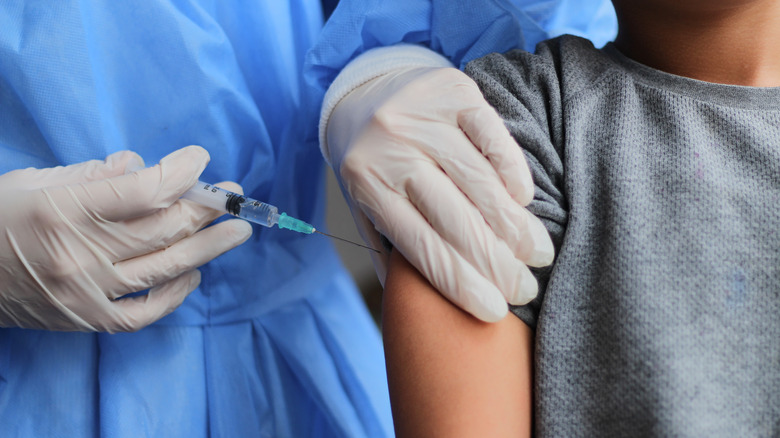Scientists Race To Develop An Epstein-Barr Vaccine In Hopes Of Preventing Linked Diseases
The Epstein-Barr virus is a common, contagious virus that affects a great deal of the population. The Cleveland Clinic reports that 95% of adults and 50% of children in the U.S. experience some type of Epstein-Barr virus over the course of their lives. Once you have the virus, it never leaves your body, and it can remain dormant and reactivate at any time, according to the Centers for Disease Control and Prevention (CDC).
The virus is linked to several conditions, including mononucleosis. Studies have also linked the virus to lupus, multiple sclerosis, inflammatory bowel disease, celiac disease, rheumatoid arthritis, type 1 diabetes, and juvenile idiopathic arthritis, according to Medical Xpress. There is evidence that the virus contributes to 1.5% of all cancer cases worldwide, per a report by the Annual Review of Pathology. A study published in the journal Allergy also finds an association between Epstein-Barr virus and long COVID. These connections have researchers working to develop a vaccine to help prevent the virus.
Clinical trials are underway
Some trials are already underway. One is being carried out by the National Institute of Allergy and Infectious Diseases (NIAID), which is in its early stages (via National Institutes of Health). The vaccine targets a protein found on the surface of the virus and cells infected with it. The vaccine utilizes ferritin, an iron protein found in all blood cells. Moderna has also launched its own trial to develop a vaccine that prevents mononucleosis. Their vaccine targets four antigens, and it uses mRNA technology in the same ways that COVID vaccines do, according to UMass Chan Medical School.
"A vaccine that could prevent or reduce the severity of infection with the Epstein-Barr virus could reduce the incidence of infectious mononucleosis and might also reduce the incidence of EBV-associated malignancies and autoimmune diseases," said Dr. Anthony Fauci, director of NIAID. That said, there are some challenges involved, such as developing a vaccine that completely prevents the virus from binding to cells as well as limiting its spread and the severity of an infection (via The Guardian).


